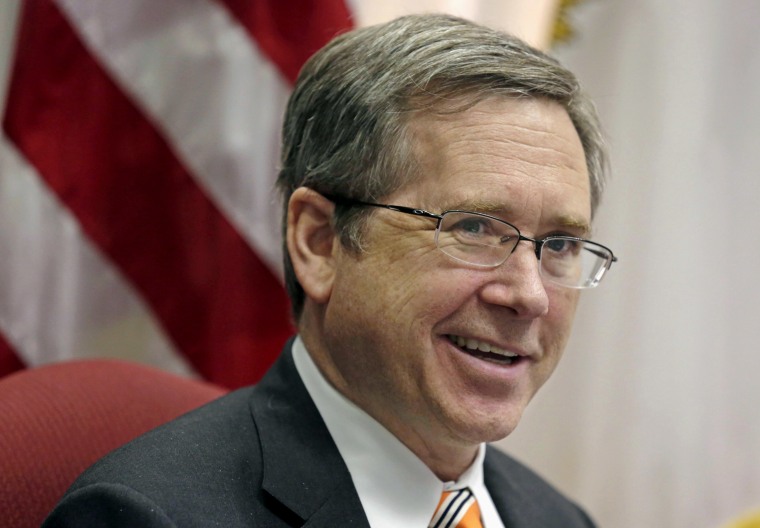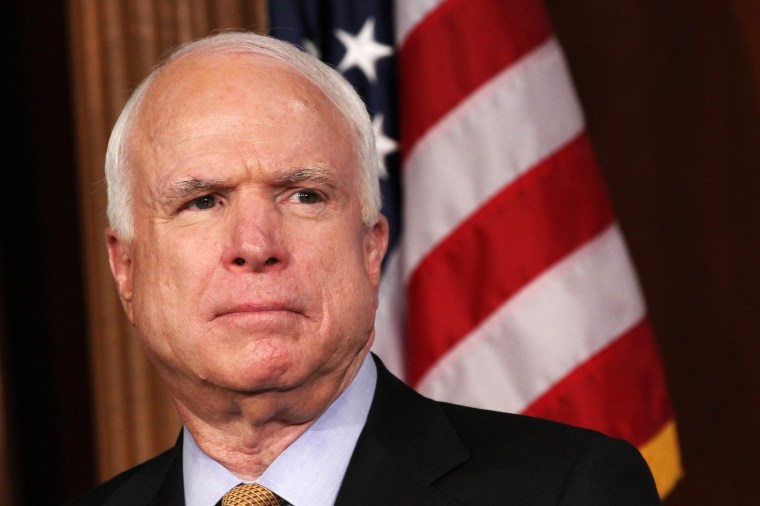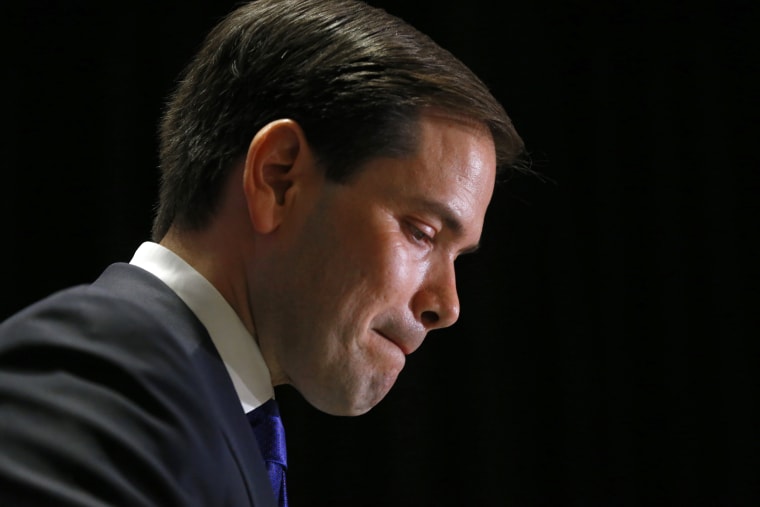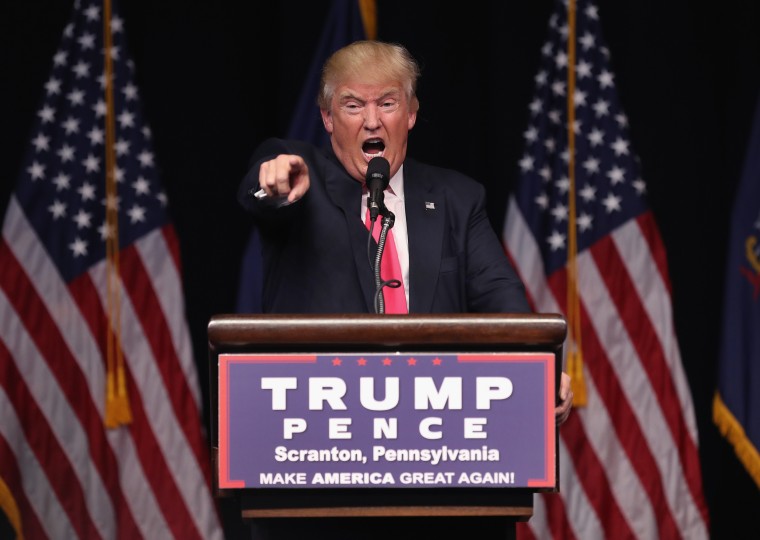With Hillary Clinton’s lead widening — in national polls and several critical swing states — and Donald Trump’s campaign in an apparent freefall after a disastrous week, Republicans have become increasingly alarmed at the prospect that Trump may be a major liability for several GOP senators up for re-election.
GOP Senate candidates, not surprisingly, are being asked about every crazy and controversial thing Trump says and does. While many GOP Senate seats were already in play before Trump became the nominee, the polarizing candidate at the top of the ticket makes it harder for GOP Senate candidates facing voters in November. “That’s the reality,” former Republican National Committee Chairman Michael Steele said Thursday.
Steele, also an MSNBC political analyst, added, “Candidates have to answer for whatever issues they need to deal with in their state. They don’t want layered on top of that the latest musings of a highly controversial presidential nominee. You don’t want the microphone stuck in your face asking you about that, too,” said Steele. “They just can’t afford to have the extra baggage on what is already a difficult re-elect.”
Related: Trump Allies Plot Intervention After Disastrous 48 Hours
The presidential contest always plays an enormous role in how Americans cast their votes in "down-ballot" races for Senate, governor, Congress, city council, and so on. If a voter chooses a party's presidential candidate, research shows, that voter will probably stick with that party all the way down the ballot.
So what happens to Republican Senate candidates if Trump loses to HIllary Clinton by a wide margin? What if Republican voters stay home on Election Day because of Trump — or worse yet, vote for his Democratic opponent?
Of course, voters could ticket-split — casting their ballot for president for one party and other lower level candidates of another party. But history suggests that's unlikely. In 1984, one out of every two Americans split their ticket, while in 2012 it was one in five. “We’re seeing the decline of ticket splitting because of the deeply-rooted polarization we’re seeing in the electorate,” said G. Terry Madonna, director of Politics and Public Affairs at Franklin Marshall College.
Related: Experts Say Trump's Muslim Ban Is 'Absolutely Unworkable'
That could have major implications for control of the Senate come November. “If either presidential candidate were to have a seven-, eight-, or nine-point lead, the opponent for the Senate in the other party will have his or hands full in getting a lot of ticket splitting,” Madonna said, adding that if Clinton wins by such a margin, the Senate will go Democratic.
There are 34 seats up for grabs in the Senate, 24 of which are currently held by Republicans. If Clinton wins, Democrats need to flip only four seats to win control of the Senate.
Several polls released on Thursday show Clinton with sizeable leads over Trump in critical states, including 11 points in Pennsylvania, nine points in Michigan and 15 points in New Hampshire. Nationally, Clinton is ahead of Trump by nine points — 47 percent to 39 percent — according to the latest NBC/Wall Street Journal poll released Thursday.
GOP Senate candidates are dealing with the Trump drama in very different ways.
ILLINOIS

There’s Republican Sen. Mark Kirk of Illinois — a traditionally blue state — who in June became the first GOP senator to unendorse Trump. Kirk, who is facing Democratic Rep. Tammy Duckworth, is considered one of the most vulnerable Senate Republicans up for re-election.
Kirk has actively gone after Trump, arguing the real estate mogul doesn’t have the proper temperament for the nation’s top job and criticizing his attacks on Hispanics, women and the disabled. Kirk has even released an anti-Trump TV ad and has painted himself as an outsider willing to buck his party for the greater good.
PENNSYLVANIA
Pennsylvania GOP Sen. Pat Toomey, in a tight race with Democratic challenger Katie McGinty, has criticized Trump, too, saying in a Philadelphia Inquirer op-ed, “I object to much in his manner and his policies” and calling his candidacy “highly problematic.”
Toomey also wrote that Clinton was “unacceptably flawed” and said that as a GOP elected official, “I am inclined to support the nominee of my party.” Still, Toomey added, “there could come a point at which the differences are so great as to be irreconcilable."
That time hasn’t yet come. Toomey routinely disavows Trump’s many controversial comments, but has yet to express explicit opposition to the candidate. In his statement on the controversy surrounding Trump’s response to the parents of a Muslim-American soldier who died fighting in Iraq in 2004, Toomey didn’t mention Trump by name, stating only that “the Khan family, like all Americans who lose loved ones in the defense of our country, deserve our gratitude and honor. Anything else is inappropriate."
But Toomey’s careful tip-toeing around Trump is enough to give Democrats fodder to charge Toomey with implicitly supporting the candidate and his many controversies, if not explicitly endorsing him. McGinty has called on Toomey to disavow Trump once and for all, telling the Courier Times this week that it’s “very disingenuous of Sen. Toomey to not come clean with the voters in this commonwealth and tell them that he’s standing with Donald Trump.”
NEW HAMPSHIRE
Sen. Kelly Ayotte, who is in a heated re-election fight against Democratic Gov. Maggie Hassan in New Hampshire, has raised eyebrows for saying she’ll support but not endorse Trump, an indication of just how much Trump complicates the race in the battleground state that went for Barack Obama in 2008 and 2012. It’s a fine line for Ayotte, who doesn't want to seem openly hostile to the party nominee, but doesn't want to be viewed as fully backing him either.
Earlier this week, Trump went after Ayotte, who did not go to the Republican National Convention and has criticized the Republican nominee’s response toward the Khan family. Trump told the Washington Post, “I don’t know Kelly Ayotte. I know she’s given me no support — zero support.” He added, “We need loyal people in this country. We need fighters in this country. We don’t need weak people.”
Ayotte is in a political bind, explained Dante Scala, a political science professor at the University of New Hampshire. “The plurality of her party in New Hampshire voted for Trump to be the nominee. For her, if she renounces Trump, she runs the risk of alienating a significant part of her base, and can’t possibly win re-election,” Scala said. “With Trump at top of ticket, he’s still going to be an anchor for her.”
ARIZONA

Arizona Sen. John McCain is trapped. He faces a competitive general election fight with Rep. Ann Kirkpatrick made likely tougher because Trump has alienated the state’s sizable Hispanic population. But first, McCain has to beat a primary challenger who’s echoing Trump’s policies and language in an attempt to paint McCain as part of the establishment. To win his primary, McCain has to stick with Trump. But sticking with Trump may cost him the general.
McCain explicitly acknowledged the trouble Trump would cause him in his race at a private fundraiser in April, before Trump nabbed the nomination. If Trump is at the top of the ticket, McCain said, “no doubt that this may be the race of my life.”
McCain, despite being one of the most maligned by Trump (who called the decorated POW a “loser” for being captured, and this week refused to endorse him because he didn’t like McCain’s treatment of veterans), has yet to disavow the GOP nominee. In a lengthy statement this week issued in response to the Khan controversy, McCain declared only: “While our Party has bestowed upon him the nomination, it is not accompanied by unfettered license to defame those who are the best among us.”
OHIO
In a state that could be a bright spot for Trump, Ohio Sen. Rob Portman has had more cover than most GOP senators seeking re-election. Trump is running neck-and-neck with Clinton there, and Portman holds a slight edge over Democratic challenger Ted Strickland in most public polls of the Senate race.
Portman issued a lukewarm endorsement of the nominee last month, but avoided the Cleveland convention despite it being in his own state, instead counter-programming a week of campaign events meant to focus attention on his re-election bid. Portman also avoided Trump’s campaign stop in the state this week.
But in a state deeply affected by the nationwide decline in manufacturing jobs, Portman has found that tying himself to Trump on trade has helped him overcome some of the backlash he may have otherwise faced. Portman was former President George W. Bush’s U.S. Trade Representative, and has negotiated dozens of trade agreements globally.
On the Khan controversy, Portman dismissed Democratic suggestions that he should rescind his endorsement for Trump. “I again am disappointed in what he said with this Gold Star family and some other instances where I’ve spoken up and will continue to,” Portman said.
WISCONSIN
Sen. Ron Johnson is another endangered Republican who has tried to walk the fine line of “supporting” Trump rather than “endorsing” him. While Johnson said he would support the GOP nominee, he insisted it wasn’t an endorsement because “to me, endorsement is a big embrace.”
Johnson then said he’d stand up to Trump where necessary, but this week avoided addressing Trump’s comments on the Khan family altogether in the first statement he issued in response.
“Captain Humayun Khan, and all the Americans who have made the ultimate sacrifice for our country, deserve our deepest respect and gratitude,” Portman said Monday. The next day, he went a step further, calling for Trump to apologize to the Khan family but admitting he didn’t believe Trump would.
The comments were emblematic of Johnson’s uneven strategy for dealing with Trump: He previously said he’d appear on the stump with the candidate, but this week said he’s skipping Trump’s Wisconsin event Friday. Polls show Johnson facing a stiff challege from former Democratic Sen. Russ Feingold.
ALASKA
Alaska Sen. Lisa Murkowski — who faces a crowded GOP primary on Aug. 16 — seems to reluctantly be backing Trump despite his “numerous inappropriate statements." She also stressed that Trump needs to change his focus to the economy and uniting Republicans.
FLORIDA

Sen. Marco Rubio of Florida is in perhaps one of the most unique situations as a former GOP presidential contender who traded vicious attacks with Trump during the primaries on several fronts, including domestic and foreign policy — and their personal appearances. Rubio has said he’ll back Trump, but he also believes everything he said during the presidential campaign.
Rubio, who weathered Trump calling him “Little Marco,” seems to view Trump as a liability. Rubio told the Tampa Bay Times this week that “I have my own campaign to run” even though Trump is stumping in his state. Rubio is expected to face Democratic candidate Patrick Murphy, who is expected to win his primary later this month against Rep. Alan Grayson. Murphy has already used Trump against Rubio, accusing him of pursuing his political ambition instead of standing up “to his party’s racist nominee for president.”
